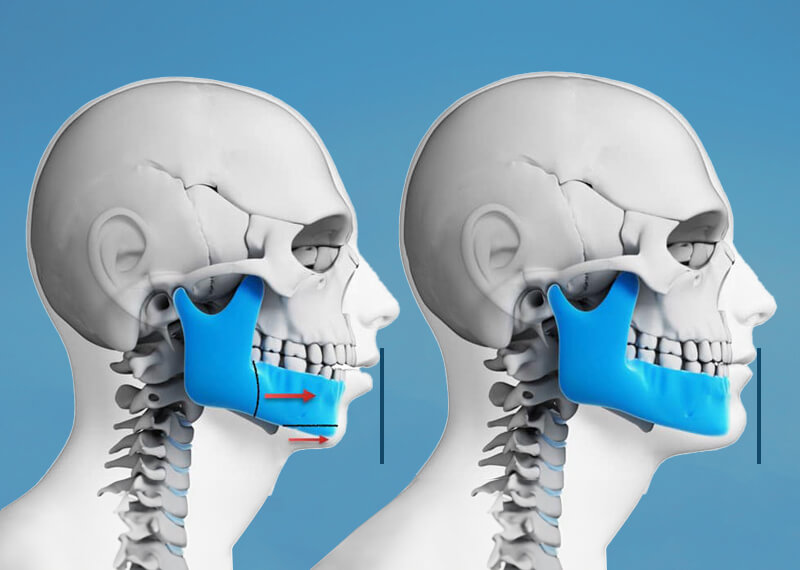
Orthodontics is designed to reposition and straighten teeth. However, sometimes braces alone cannot completely address the patient's dental and skeletal issues. If the root of the problem is malalignment of the jaw (maxilla and mandible), which stems from atypical skeletal growth, corrective jaw surgery (Orthognathic Surgery) accompanied with braces may be the best choice to correct the bite. This surgery can move your teeth and jaws into a new position that results in a more attractive, functional, and healthy dento-facial relationship.
People who can benefit from orthognathic surgery include those with an improper bite or jaws that are positioned incorrectly. Jaw growth is a gradual process; in some instances, the upper and lower jaws may not match at the end of growth. The result can cause a host of problems that can affect chewing function, speech, long-term oral health, and appearance. Some bite problems can not be corrected by orthodontics alone.
The following are difficult areas that will be evaluated for possible corrective jaw surgery:

Any of these symptoms can exist at birth, be acquired after birth as a result of hereditary or environmental influences, or as a result of trauma to the face.
If our orthodontist determines you may be a candidate for orthognathic surgery, we will give you a referral to a trusted oral surgeon specialist so you can meet and discuss all of your treatment options.
It's important to remember that braces mainly focus on the teeth and not the actual jawbone. In many cases, an uneven jaw can be fixed with braces or other orthodontic treatments. This may include braces, elastics, or a combination of specialized appliances. Moving the teeth into their correct position will allow your orthodontist to re-align your bite into a healthy position. But, if your facial asymmetry is caused by the jaw, traditional braces will not offer a significant benefit. Jaw alignment issues require additional treatments, like orthognathic surgery.
There are several signs that may indicate that your jaw is misaligned. You may have difficulty chewing or experience pain in your jaw, teeth, or ears. You may also notice that your teeth do not line up properly when you bite down.
Jaw surgery, also called orthognathic surgery, is surgery that helps align your upper jaw (maxilla) and lower jaw (mandible). If your jaws don't line up, it can affect your bite and make it hard for you to eat and speak.
The existing bone progressively fuses with the implanted bone, causing a dramatic shift in the breadth and length of your chin that is visible on the face. You will most likely appear more symmetrical and well-proportioned. An overbite can be corrected with jaw surgery. Below is a case example to see the dramatic change in her facial profile.

Initial jaw healing typically takes about 6 weeks after surgery, but complete healing can take up to 12 weeks. After initial jaw healing, at about 6 weeks, your orthodontic treatment with braces will continue to align your teeth. The entire orthodontic process, including surgery and braces, may take a couple of years to complete.
Many of the benefits you may get may include an easier time speaking and better swallowing. You may have a better time chewing and biting food, and you may have less wear on your teeth. If your teeth have been breaking down due to your jaw problem, this surgery can put an end to it. The question of "Should I do it or not?" really comes down to your own personal choice. The doctors will all explain the pros and cons of the procedure, and you will have all the information you need to decide what's best for yourself or your child's future.

The best way to learn what orthodontic treatment could do for you or your child is to schedule a complimentary initial exam. We will determine the best course of treatment and answer all your questions. Book your initial appointment online now using the link below, or just simply call our office.
Schedule COnsultation